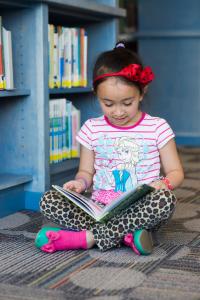Most kids learn to read through explicit, systematic instruction at school. But, we all know learning at school is only a small piece of the learning environment kids are exposed to. So how can you support your child as they navigate the process of learning to read? One way is by helping them practice and master important skills that support their growth from developing to proficient readers. No single skill is more important than another, and they develop simultaneously through practice and repetition as children become more adept and experienced readers.
There are many fun ways that caregivers can help children practice these skills!
- Sharing supportive books and materials with children
- Reading aloud to model fluent reading skills
- Helping children read aloud and sound out words
- Playing board games
- Sharing crafts and activities
- Listening to audiobooks
- Attending library programs
Skills for Developing Readers
Reading Motivation: Reading Motivation is critical to ensure kids enjoy reading, and happens when kids can self-select books that reflect their interests and life experiences demonstrate more reading motivation. Encourage your reader to choose books that interest and inspire them to read, practice and build their skills.
Background Knowledge: Background knowledge is everything readers know before they start to read. All of the vocabulary and concepts they already know will help when they try to decode and comprehend new words and ideas. Help your reader build background knowledge by introducing new ideas and experiences--and then talking about them.
Decoding: Decoding is what happens when readers put together letter sounds to figure out words. Letters and letter combinations all represent different sounds--like a code. To decode a word, readers have to connect the letters with the sounds. Help your reader practice decoding by encouraging them to sound out words when they read.
Fluency: Fluency is what happens when a reader can decode words and comprehend them at the same time. Fluent readers are connecting individual words to read smoothly and with expression. Read books aloud with your reader over and over again to build fluency skills.
Comprehension: Comprehension happens when readers understand what they are reading. Readers with comprehension skills can explain what they are reading. They can make connections between what they read and their own lives. Have conversations with your reader about what they are reading to help build comprehension skills.
